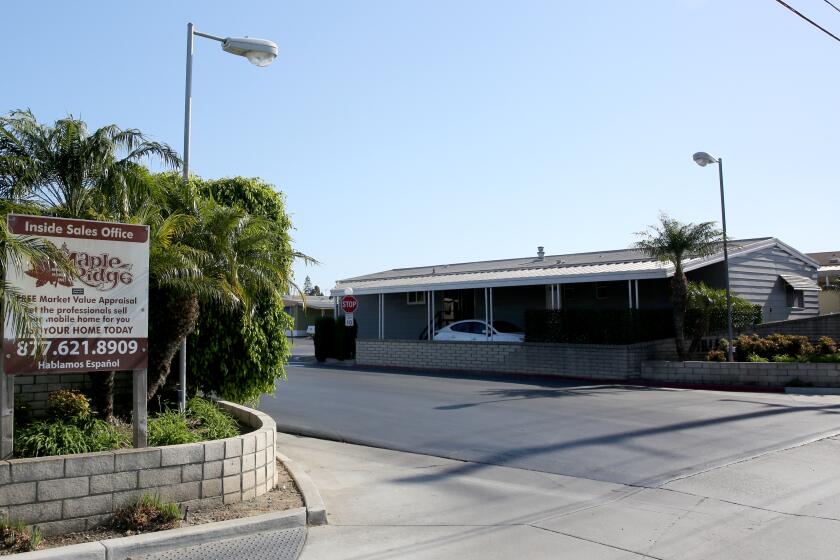Costa Mesa approves new rules for local group and sober-living homes
- Share via
Operators of group and sober-living homes in Costa Mesa have a host of new rules to comply with after a split City Council decision Tuesday night.
On a 3-2 vote, with members Allan Mansoor and Jim Righeimer opposed, the council officially adopted additional regulations geared at increasing transparency and preventing people who were evicted from such facilities from becoming homeless.
Under the approved rules, operators will have to notify a resident’s contact of record before he or she is involuntarily discharged from a group home or sober-living facility — the latter of which generally house recovering drug addicts and alcoholics who are considered disabled under state and federal law.
Operators also would have to contact both the city’s Network for Homeless Solutions and the Orange County Health Care Agency’s OC Links Information and Referral Line to determine what services might be available and share that information with the resident who is being removed.
Operators of group homes with six or fewer residents in single-family neighborhoods will have to make transportation available so residents who are involuntarily removed can get back to their permanent address or the one listed on their driver’s license.
That requirement was already in place for group homes in areas of multifamily residences.
Should an occupant decline to return home, operators would be responsible for providing transportation to another facility, provided a bed is available.
Mayor Katrina Foley said city staff needs to have “zero tolerance” for violations of the rules and be prepared to revoke permits from operators who don’t comply.
“I think that’s why we’re making these changes — to prevent that type of activity from continuing to occur,” she said.
Additionally, the city will require full disclosure of the ownership interests of group and sober-living homes. Those applying to open such facilities also will have to divulge whether they’ve held a similar license or permit elsewhere and whether it was ever suspended or revoked.
The revised rules largely maintain the city’s requirement that group homes and licensed alcohol and drug treatment facilities be at least 650 feet from one another in residential neighborhoods, though the council and Planning Commission can deviate from that if it wouldn’t create an over-concentration in a specific area.
Mansoor and Righeimer didn’t discuss their dissenting votes Tuesday, but Righeimer said during council discussions last month that he didn’t support giving the council and Planning Commission that leeway.
Facilities with at least seven residents in multifamily areas will still need a conditional use permit to operate, which requires approval from the Planning Commission.
Homes with up to six residents will have to get a special use permit to operate in residential zones. Those requests are decided at the administrative level by the director of development services or the director’s designee.
Under the approved modifications, the city will provide notice to all owners and occupants of properties within 500 feet of a site where someone has applied for a special use permit. The notice will include the date and time of a hearing on the sought-after SUP.
Decisions on such permits can be appealed to the Planning Commission, though a few residents said Tuesday that they’re concerned about the cost of doing so.
The city charges $690 to appeal a decision to the Planning Commission. Appealing a commission decision to the City Council costs $1,220.
“It seemed very clear that the public wanted this business done in public, so I’m a little disappointed that you’ll get a public notice but it’s just one person making the decision on the SUPs,” said resident Robin Leffler. “It’s not a body of the city like a Planning Commission or the City Council that will deliberate this.”
Foley said residents can ask a commissioner or council member to call up an item for review on their behalf.
“I empathize with the point,” she said. “However, we’re trying to balance all the interests and make sure we comply with the law.”
Twitter @LukeMMoney
All the latest on Orange County from Orange County.
Get our free TimesOC newsletter.
You may occasionally receive promotional content from the Daily Pilot.




